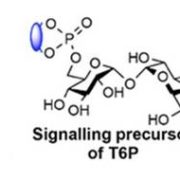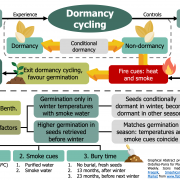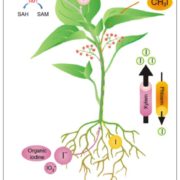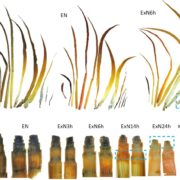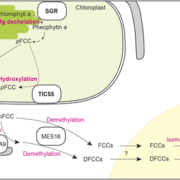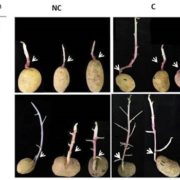Melatonin represses oil and anthocyanin accumulation in seeds (Plant Physiol.)
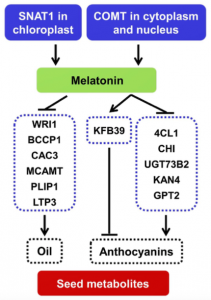 Seed oils and anthocyanins play several roles in plant physiology and are promising substances for crop engineering given their benefits for human health. Recent studies proposed that melatonin –a potent antioxidant present in all plant species– regulates the deposition of these metabolites in seeds, but the mechanism behind this is still missing. In this paper, Li et al. assessed the effects of knocking out the genes SNAT1 and COMT, which codify the enzymes in charge of synthesizing melatonin from serotonin, in the accumulation of fatty acids and anthocyanin in Arabidopsis thaliana seeds. They show that losing the function of one or both genes increased the levels of both classes of metabolites and that applying exogenous melatonin was enough to decrease them back to standard concentrations. Additionally, genes related to fatty acids and anthocyanins synthesis –rather than those implicated in their deposition– were upregulated in mutants. Taking all these results, the authors suggest that melatonin is a negative regulator for the production of seed fatty acids and anthocyanins. Moreover, they show that SNAT1 and COMT also control other seed features, like mucilage production and its proanthocyanidin content. (Summary by Carlos A. Ordóñez-Parra @caordonezparra) Plant Physiol. 10.1104/pp.20.00117
Seed oils and anthocyanins play several roles in plant physiology and are promising substances for crop engineering given their benefits for human health. Recent studies proposed that melatonin –a potent antioxidant present in all plant species– regulates the deposition of these metabolites in seeds, but the mechanism behind this is still missing. In this paper, Li et al. assessed the effects of knocking out the genes SNAT1 and COMT, which codify the enzymes in charge of synthesizing melatonin from serotonin, in the accumulation of fatty acids and anthocyanin in Arabidopsis thaliana seeds. They show that losing the function of one or both genes increased the levels of both classes of metabolites and that applying exogenous melatonin was enough to decrease them back to standard concentrations. Additionally, genes related to fatty acids and anthocyanins synthesis –rather than those implicated in their deposition– were upregulated in mutants. Taking all these results, the authors suggest that melatonin is a negative regulator for the production of seed fatty acids and anthocyanins. Moreover, they show that SNAT1 and COMT also control other seed features, like mucilage production and its proanthocyanidin content. (Summary by Carlos A. Ordóñez-Parra @caordonezparra) Plant Physiol. 10.1104/pp.20.00117


